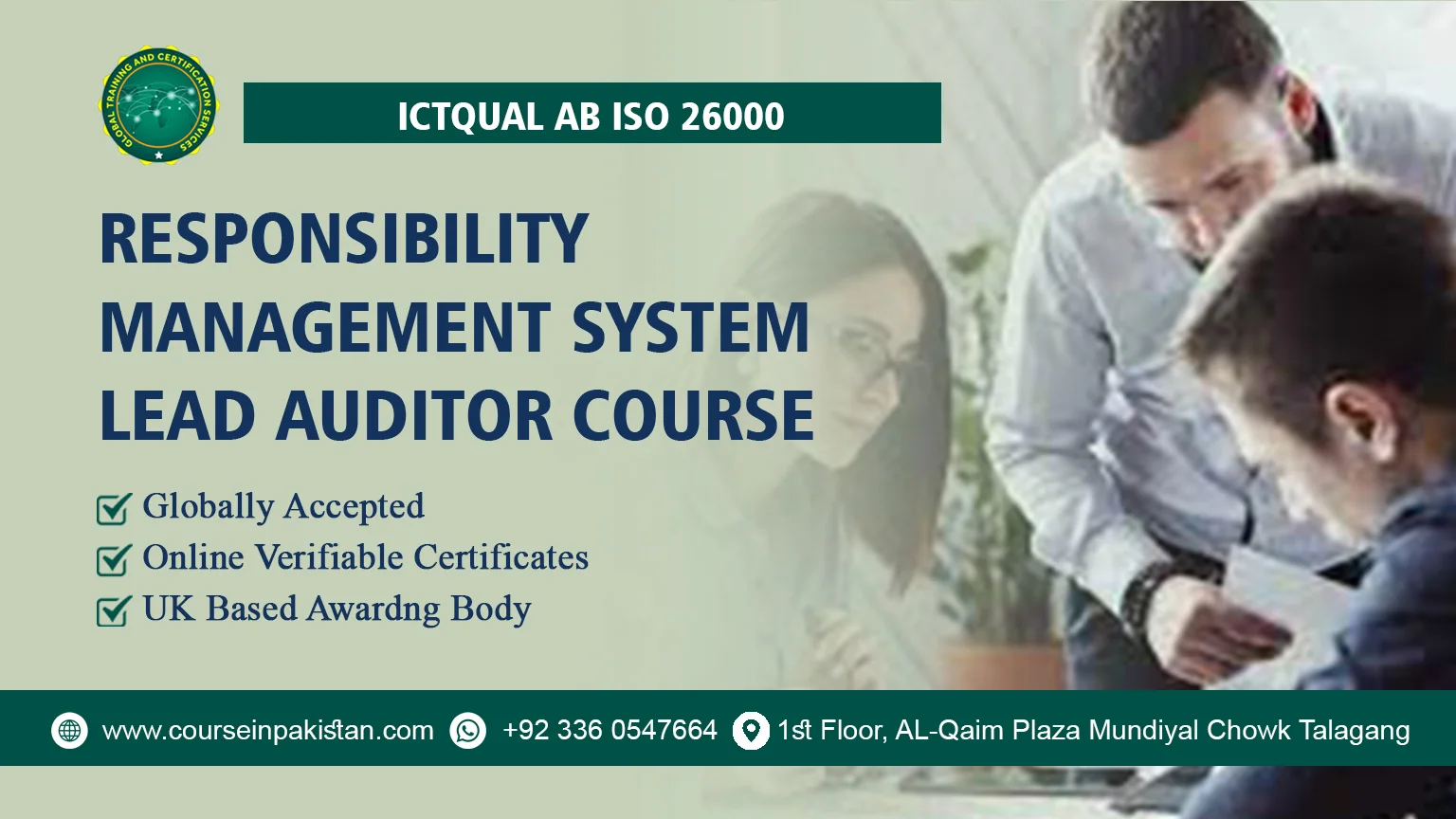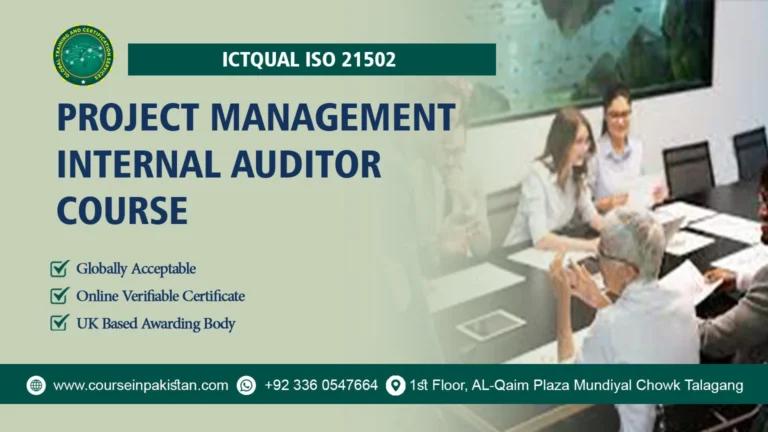
ICTQual ISO 26000 Social Responsibility Management System Lead Auditor Course
In today’s interconnected world, where corporate actions are scrutinized for their impact on society and the environment, the need for robust social responsibility practices has never been more critical. ISO 26000 provides a comprehensive framework for organizations to integrate social responsibility into their operations, ensuring ethical behavior, sustainability, and positive contributions to communities. The ISO 26000 Social Responsibility Management System Lead Auditor Course is designed to empower professionals with the skills and expertise to audit and enhance social responsibility practices within organizations.
Course Introduction
The ISO 26000 Social Responsibility Management System Lead Auditor course is a specialized training program that focuses on equipping participants with the knowledge and tools necessary to lead audits based on ISO 26000 guidelines. The course emphasizes understanding the principles of social responsibility, evaluating organizational practices, and driving continuous improvement in social responsibility performance.
Course Overview
Participants in the course will engage in interactive sessions, practical exercises, case studies, and discussions designed to deepen their understanding of social responsibility management systems. The course covers essential topics such as audit planning, conducting audits, reporting findings, and implementing corrective actions based on ISO 26000 principles. Emphasis is placed on applying auditing techniques to assess adherence to social responsibility standards and driving positive organizational change.
Course Benefits
- Expertise Development: Gain a comprehensive understanding of ISO 26000 guidelines and auditing practices related to social responsibility.
- Career Advancement: Obtain a globally recognized lead auditor certification in social responsibility management systems, enhancing career opportunities.
- Organizational Impact: Help organizations strengthen their commitment to social responsibility, sustainability, and ethical practices.
- Stakeholder Trust: Build trust and credibility with stakeholders, including customers, investors, and communities, through transparent and responsible business practices.
Course Study Units
- Introduction to Social Responsibility
- Core Subjects of Social Responsibility
- Principles of Auditing Social Responsibility Management Systems
- Planning and Preparation for Social Responsibility Audits
- Conducting Social Responsibility Audits
- Reporting and Documentation of Audit Findings
- Corrective Action and Follow-Up
- Continuous Improvement and Professional Development
Learning Outcomes
- Introduction to Social Responsibility:
- Define social responsibility and its importance in organizational sustainability and ethical practices.
- Understand the impact of social responsibility on stakeholders, communities, and the environment.
- Recognize the benefits of integrating social responsibility into business strategies and operations.
- Explore global frameworks and standards guiding social responsibility practices.
- Core Subjects of Social Responsibility:
- Identify and describe the core subjects and issues addressed by social responsibility frameworks.
- Analyze how organizations address social responsibility in areas such as human rights, labor practices, environment, fair operating practices, consumer issues, and community involvement.
- Evaluate the alignment of organizational practices with social responsibility principles and guidelines.
- Principles of Auditing Social Responsibility Management Systems:
- Understand the principles and objectives of auditing social responsibility management systems.
- Apply auditing principles, including independence, impartiality, confidentiality, and competency, to social responsibility audits.
- Assess the effectiveness of social responsibility management systems in achieving organizational goals and stakeholder expectations.
- Identify legal and regulatory requirements relevant to social responsibility audits.
- Planning and Preparation for Social Responsibility Audits:
- Develop audit plans based on organizational context, objectives, and stakeholder expectations.
- Define audit scope, criteria, and methodologies in accordance with social responsibility standards.
- Prepare audit documentation, including checklists, procedures, and audit schedules.
- Allocate resources and coordinate logistics for conducting effective social responsibility audits.
- Conducting Social Responsibility Audits:
- Utilize auditing techniques, such as interviews, document reviews, and observations, to gather audit evidence.
- Evaluate the implementation and effectiveness of social responsibility practices and initiatives.
- Verify compliance with social responsibility standards, policies, and procedures.
- Document audit findings accurately and objectively based on collected evidence.
- Reporting and Documentation of Audit Findings:
- Prepare clear and concise audit reports that outline findings, observations, and conclusions.
- Communicate audit results to relevant stakeholders, including management and audit clients.
- Document supporting evidence and references to substantiate audit findings.
- Provide recommendations for improvement and corrective actions based on audit findings.
- Corrective Action and Follow-Up:
- Assist organizations in developing corrective action plans to address identified non-conformities and gaps.
- Monitor the implementation of corrective actions to ensure timely and effective resolution.
- Verify the effectiveness of corrective actions through follow-up audits or reviews.
- Support continuous improvement efforts by identifying opportunities for enhancing social responsibility performance.
- Continuous Improvement and Professional Development:
- Establish mechanisms for ongoing evaluation and enhancement of social responsibility management systems.
- Promote a culture of continuous improvement in social responsibility practices within organizations.
- Stay updated with advancements in social responsibility standards, regulations, and best practices.
- Pursue professional development opportunities to enhance auditing skills and expertise in social responsibility management systems.
These learning outcomes collectively equip auditors and professionals with the knowledge, skills, and competencies necessary to effectively audit social responsibility management systems. They ensure organizations uphold ethical practices, meet stakeholder expectations, and contribute positively to sustainable development goals.
Who Is This Course For?
This course is ideal for professionals involved in CSR, sustainability management, corporate governance, and auditing roles, including:
- CSR managers and directors
- Sustainability managers and coordinators
- Compliance officers and auditors
- Consultants specializing in social responsibility practices
- Professionals seeking to enhance their auditing skills in ethical and responsible business practices
Future Progression for This Course
Upon successful completion of the ISO 26000 Social Responsibility Management System Lead Auditor course, participants can advance their careers and contribute to organizational sustainability in several ways:
- Lead Auditor Certification: Obtain certification as a lead auditor in social responsibility management systems, recognized globally.
- Specialization: Pursue specialized roles in auditing and consulting for social responsibility practices across various industries.
- Consulting and Training: Offer consulting services or training courses on ISO 26000 implementation and auditing.
- Continuous Professional Development: Stay updated with advancements in social responsibility standards and practices through ongoing education and professional development.
ISO 26000 Social Responsibility Management System Lead Auditor course equips professionals with the knowledge, skills, and credentials to drive meaningful change within organizations, promoting ethical business practices, sustainability, and stakeholder trust. It represents a significant opportunity for personal growth, career advancement, and positive societal impact through responsible business leadership.






